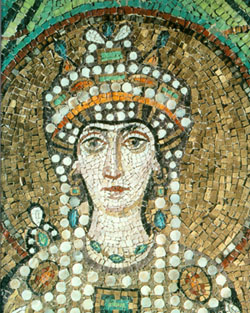 Contents -
Previous Article -
Next Article
Contents -
Previous Article -
Next Article
One would not think that fan loyalty to a popular team would cause a national rebellion against a powerful empire, but that is exactly what happened in the city of Constantinople in A. D. 532. The most popular pastime of the day was watching the wild and often dangerous chariot races in the magnificent city’ s Hippodrome, or oval race track. The two rival racing teams, the Blues and the Greens, were also closely linked with rival political factions and organized criminal gangs. It was an arrangement that might seem strange to us in this day and age, somewhat like an alliance between popular football teams and political parties, each with its gangs of thugs bent on intimidating the people to support their program. Can you imagine the Pittsburgh Steelers linking up with the Republican Party against the Oakland Raiders and the Democratic Party?
These powerful political leagues, known as demes after the Greek word for neighborhood, usually opposed each other in the scramble for popularity and political power. In the year A. D. 532, however, the emperor Justinian’s move to impose new taxes and collect other taxes that had seen lax enforcement in the past caused many people to lose their fortunes and others to endure great economic hardship. Discontented subject. both rich and poor alike, began to settle in the city of Constantinople with hopes that they might present their case before the emperor and have the harsh levies reduced or forgiven altogether. When Justinian decided to crack down on the abuses of the demes and attempt to curb their power, the two rival factions united against him. When Justinian ordered the execution of some of the ringleaders from both the Blues and the Greens who had been convicted of crimes, the hangman bungled the job and two fell from the gallows alive. The angry crowd immediately tried to drag the two men to a church, where they would be able to claim sanctuary and be legally safe from the government's efforts to execute them.
Justinian's troops tried to prevent the crowd from carrying the victims to safety, and a riot broke out. Starting in the Hippodrome, the riot soon spread to other parts of Constantinople and grew to become a full-scale insurrection. Soon the rebels had set fires in all parts of the city and were seeking a nephew of the former emperor Anastasius to put on the throne in the place of Justinian. This individual, Hypatius by name, attempted to flee, for he knew that being elevated to the throne could only bring him misfortune. It was most likely that Justinian would soon regain the upper hand and quell the revolt, in which case Hypatius would be condemned and executed as a traitor. Even if the mob succeeded in deposing Justinian, the unruly rebels would probably soon tire of him and give him the same vicious, humiliating death that Roman mobs had been delivering for centuries to those of whom they had no more use. The revolt continued for several days until the poor wretch was found and clothed in the purple robes that would eventually bring with them the kiss of certain death.
Justinian was in desperate straits. Having barricaded himself in his palace with his advisors, he was on the verge of fleeing in a fast warship. His advisors told him to save himself and make good his escape, but the empress Theodora stood up before the group of men and called upon Justinian to stand his ground and fight for his throne. Any life after having once been an empire was no life, she said, and a death shrouded in the purple robes of an emperor was much preferable to living in safety as a commoner and a coward. Justinian took strength and courage from his wife, and concocted a plan with his generals Narses, Belisarius, and Mundus to deal with the rebels.
Justinian sent special agents into the Hippodrome to stir up trouble between the Blues and the Greens. Soon, most of the rebels, agitators, and other malcontents were gathered into the Hippodrome, which they had chosen for their base of operations. Belisarius and Mundus quietly closed the gates, trapping the mob inside. With Narses stationed at the one gate left open where he could deal with those who tried to escape, the two other generals led their German troops into the Hippodrome and systematically cut down all who were unlucky enough to be left inside. Narses ruthlessly finished off those who attempted to escape through the one open gate. The seats and bleachers that had once been crowded with excited fans cheering their teams were now slippery with blood, and thirty thousand corpses now littered the sand of the arena, which was stained a deep red. With most of the rebels slaughtered and the few stragglers fleeing for safety, the Nika revolt was over. Justinian was inclined to pardon the unfortunate Hypatius who never really had an opportunity to act as emperor, but Theodora insisted that he must die. The next day, Hypatius was put to death and the body of the man who never wanted to be emperor was cast into the sea.
Go to next article:
Go back to previous article: